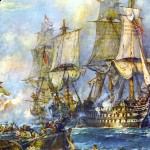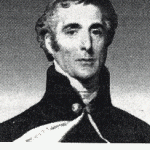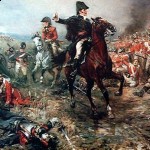The Napoleonic Wars Go on
Category: 19th centuryNapoleon had many years of victory before him in 1799. A short and brilliant campaign reconquered Italy, and the Second Coalition collapsed in the last days of 1800. In the years that followed, with Britain alone left in the war and no important land operations, Na poleon created the Code Napoleon and an efficient civil service. In 1802 Britain had to make peace with Napoleon at Amiens, The Treaty of Amiens was a mere truce. It left France in control of Holland and all the western bank of the Rhine. War broke out again the following year.
When the war was resumed, Napoleon had Spain and Holland as his allies, and was making plans to invade Britain if the French and Spanish fleets could be concentrated to cover the crossing. These plans never came true, as both fleets were destroyed in the glorious battle of Trafalgar.
The naval battle of Trafalgar, one of the most celebrated naval engagements in European history, was fought on October 21, 1805, by a British fleet and a combined French and Spanish fleet. The battle took place off Cape Trafalgar on the southern coast of Spain, where a British fleet of 27 ships under the command of Admiral Nelson had to fight against a slightly larger combined enemy fleet commanded by a French admiral.
The French admiral had the intention to slip out of Cadiz, which was under British blockade, to land troops in southern Italy, where the French were fighting. The fleet, however, was intercepted by Nelson on October 21.
The French and Spanish ships formed their ships into a single battle line, south to north. Nelson, however, surprised them by ordering his ships into two groups, each of which assaulted and cut through the French fleet at right angles, demolishing the battle line. This created confusion, giving the British fleet an advantage. The battle began shortly before noon and ended late in the afternoon. Some 20 French and Spanish ships had been destroyed or captured, while not a single British vessel was lost. The British suffered about 1500 casualties, among them Admiral Nelson, who was mortally wounded. The British naval victory under Horatio Nelson saved Britain from invasion. The great naval battle of 1805 is recorded in the name of Trafalgar Square in London. The square is dominated by the 145-ft. fluted granite column supporting a large statue of Nelson, with four lions at the base and four bronze reliefs cast from captured French cannon and illustrating the battles where they were taken.
The year 1805 witnessed the creation of the Third Coalition with Russia and Austria, which also collapsed in 1807. Napoleon then ruled a vast empire which included Northern Italy, the East coast of the Adriatic, all the territory west of the Rhine with Holland and a large area of North Germany from Cologne to Lubeck. Spain, Naples, Poland and all Central and Southern Germany formed his vassal states.
It was upon Russia and Spain that Napoleon was finally broken. Neither of these counties had a strong middle class that made the victory of the French easier in other European countries. For a time Napoleon and Alexander I combined to dominate Europe. There were plans to marry a Russian Grand-Princess to the French emperor to strengthen the political union, but Napoleon was not prepared to treat the Tzar of Russia as an equal and Alexander refused to be subordinate.
Failing all else Napoleon tried to strike at Britain by imposing a European ban on the British manufactured goods. Britain replied with a blockade. Both the ban and the blockade were not completely effective. But these caused a strain that broke the alliance between France and Russia and the other North European countries.
Important events took place in Portugal and Spain. Portugal had been for a century dominated by the British government, and that was the reason of the country’s refusal to recognize Napoleon’s “Continental System”. A French army was sent there to prevent trade between Portugal and Britain. At the same time, Napoleon made an attempt to change his indirect control over Spain for a direct rule by making his brother Joseph the Spanish king. This provoked an instantaneous and universal revolt. The Spainsh led an active guerrilla war against the French, and Napoleon was forced to concentrate larger and larger forces in Spain.
An army of nearly half a million — Poles, Germans and Italians as well as Frenchmen — was massed by Napoleon in 1811 to invade Russia. The march of the Grand Army to Moscow in 1812 and its disastrous retreat set Europe once more ablaze.
Germany rose against the defeated emperor and at last the French found themselves opposed to nations in arms. Although the French emperor quickly collected a new army that was almost as large as the one he had lost in Russia, Napoleon was decisively beaten at Leipzig in October 1813.
In spite of this he rejected an offer of peace which would have given him the Rhine as a frontier and in April 1814 the allies entered Paris. The Bourbons were restored, and Napoleon was banished to the Island of Elba.
Britain, Austria, Prussia and Russia then sent their representatives to the Congress of Vienna to discuss the important problems of European policy. The work of the Congress was interrupted in 1815 by Napoleon, who had escaped from the exile and, having returned to France, launched the Hundred Days’ Campaign which ended with his defeat at Waterloo.
In France the restoration of the Bourbons did not mean the restoration of aristocratic privilege in the villages or the suppression of the Code Napoleon. In Germany, though Prussia extended her power over the Rhine-land, many of the social changes resulting from the French occupation went undisturbed. Small German states were drawn together into the German Confederation in which Austria and Prussia both participated and which inevitably became the theatre of a battle between them for the hegemony of Central Europe.
The victory over Napoleon laid the foundations for a great extension of the British Empire. Britain got a number of strategic key points: Malta, Mauritius, Ceylon, Heligoland and the Cape, then inhabited only by a few Dutch farmers and valued only as a stopping place on the way to India. Yet the first result of the peace was a severe political and economic crisis.



